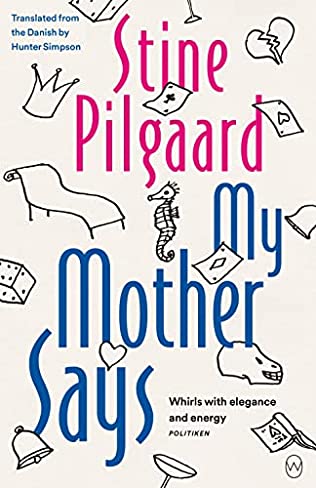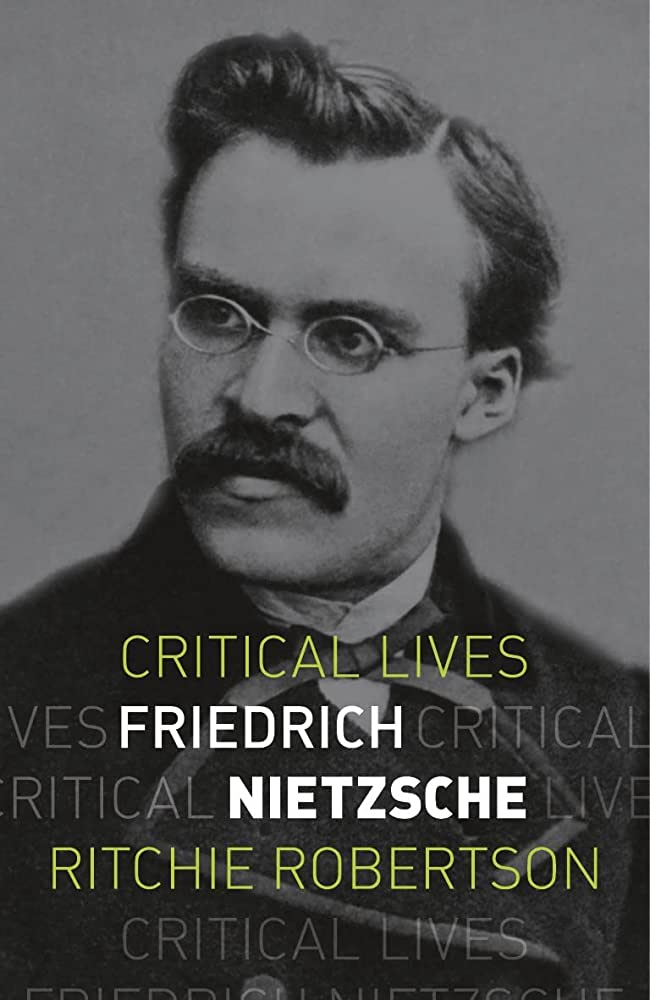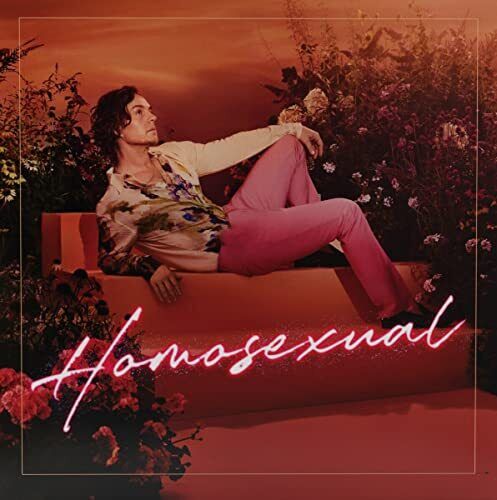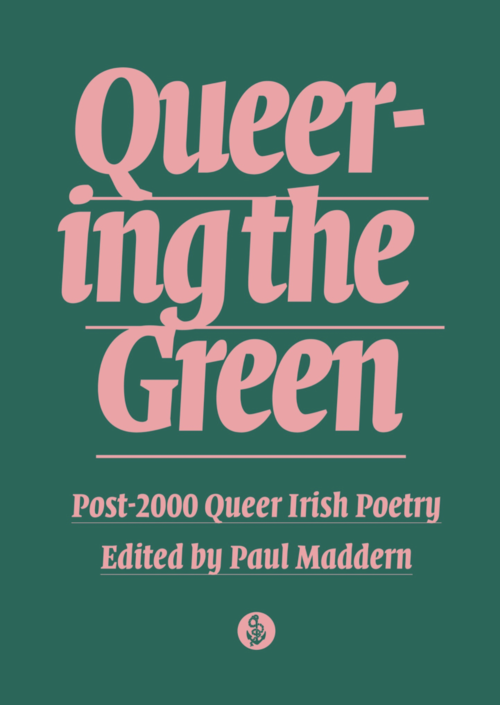 QUEERING THE GREEN
QUEERING THE GREEN
Post-2000 Queer Irish Poetry
Edited by Paul Maddern
The Lifeboat Press. 423 pages, £15.
This 460-page, forest-green brick designed with a pink font and French flaps is a formidable collection of contemporary poetry by 31 gay and lesbian Irish writers. With the exception of five born in Iran, Zambia, India, Russia, and the Netherlands, they come from Ireland and Northern Ireland. Most are established poets, yet for some this marks an early publication of their work. In his thoughtful introduction, Maddern expresses his desire to balance representation, diversity, and quality: “The irony, of course, is that by grouping queer writers in this publication, I risk the very type of marginalization I argue against.” Along with his hope that readers will appreciate the poems for their depth and beauty, Maddern clarifies that an author’s identity as queer was not the sole criteria for consideration. (He dislikes “lgbtqia” and the like, which encourage people to tick off boxes.)
The title evokes a ballad of the 1798 Irish rebellion, “The Wearing of the Green,” and is inspired by Yeats’ poem of the Irish Civil War, “Easter, 1916,” which places these contemporary writers in historical context. For Yeats, wearing green was not only a nationalist symbol; it became a metaphor for social transformation. A hundred years later, Maddern notes, ever since the 1998 Good Friday Agreement, identity politics are no longer dominated by the Protestant–Catholic, North–South divides. Poems addressing Brexit, climate change, gender identity, and the marginalization of women, refugees, and people of color situate queer Irish poets as part of a global conversation. Maddern has chosen serious poets who write in a range of styles. However, his stated priority is illuminating a reconfiguration of Irish identity that includes queer people: “We are not a footnote. We are not a box ticked.”
Thomas Keith
My Mother Says (published in Denmark in 2012) is the first novel by award-winning Danish writer Stine Pilgaard. Quirky and charming, her wry humor comes through even in translation. No one in this novel, except for a couple of friends, is given a name, but it’s not difficult to keep track of who’s who.
The narrator is a twenty-something woman whose lover, a zookeeper, is ten years older and wants to settle into marriage and a family. That’s what caused their break-up, and the narrator is broken-hearted. Her family, consisting of her mother, stepfather, thrice-married father, and current stepmother, have no issues at all about her being a lesbian. Her father is a liberal Protestant minister, a bit of a leftover hippie, who loves Pink Floyd and dotes on his daughter. The narrator returns his affection, but she has little to give her mother, a well-meaning, conventional, insufferable real estate agent who always has to be right. The narrator’s life consists of occasional attempts at attending college classes; hanging out with her best friend and partying; and frequent visits to the office of her doctor, a man with whom she’s obsessed. But these events, and the narrator’s deeply felt “musings” that separate each chapter, coalesce into a memorable work.
Martha E. Stone
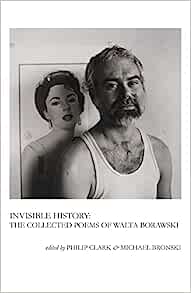 INVISIBLE HISTORY
INVISIBLE HISTORY
The Collected Poems of Walta Borawski
Edited by Philip Clark and Michael Bronski
Library of Homosexual Congress,
280 pages, $34.95
The collections of poets lost to AIDS often read like the anthologies of the World War I poets: so many wonderful, talented voices cut down tragically before their prime. What might they have done if they had lived longer? Walta Borawski is a name I was not familiar with before, but after reading this poignant collection, it’s a name I will not forget. Indeed, reading the entire output of someone who died so young is like making and then losing a friend in one sitting. Borawski (the poet shortened his first name from Walter as a tribute to Barbra Streisand, which gives you some idea of the cheeky flavor of his work) is particularly adept at capturing the realities of living and dealing with the virus. He can also be funny and heartbreaking—sometimes both at once—particularly when it comes to poems of unrequited love. And, while the introduction claims that the poems require reading aloud, their wit and pain come through remarkably well on the page. This collection should go a long way toward making Borawski’s wonderfully vivid and affecting work much better known.
Dale Boyer
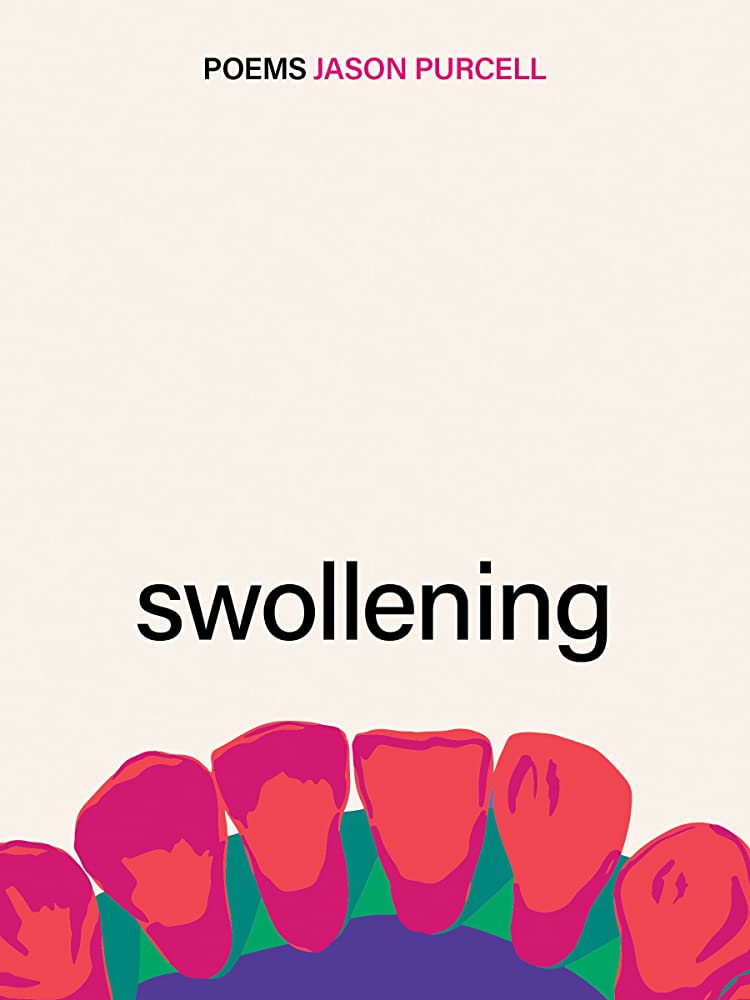 SWOLLENING: Poems
SWOLLENING: Poems
by Jason Purcell
Arsenal Pulp Press. 96 pages, $15.95
Jason Purcell calls themself “a white settler writer from Treaty 6 territory,” as one outside the boundaries of conventional society. Jason dives into their nonbinary personal angst using their dental problems as a metaphor for the larger issues of violation of the land and of the self. It’s a strange metaphor, and it’s surprising how well it works in these poems.
The poems float between a luscious lyric language and an abrupt, declarative proclamation. In one titled “Talking to your first kiss on this side of death,” they write: “That moon again. It is not what I’m reaching for. What I’m reaching for/ is a way to speak to you from across the distance, a way to pull/ from my memory of you everything that poisons it.” Like someone settling a new land, they invite us into their nonbinary world to experience how much of who we are is driven by appetite, by our jaws, by the very act of chewing, of ingesting, and of nourishing ourselves. In the end, their delving into the dark does offer us a reprieve: “We can say the pain stops./ we can say this world, what’s left of it, is for us,” which is to say the only way to find our truth is by confronting the suffering in our lives.
Bruce Spang
This comprehensive study chronicles the life, thought, and times of the iconoclastic philosopher. As an introduction to Nietzsche, it captures the shape of his thinking through his books and letters and considers his intellectual influences. Author Ritchie Robertson places Nietzsche’s works into the progression of his life. He offers interesting insights into why so many readers have engaged with Nietzsche “with a combination of enthusiasm and critical reserve,” thrilled by the breaking of traditions but frightened by the implications.
While there are few revelations, the author offers some interesting and even surprising speculations about Nietzsche’s personality. Based on Nietzsche’s rigid adherence to school rules as a child, he suggests that Nietzsche may have been on the autism spectrum. He also wonders if Nietzsche’s various illnesses, especially his debilitating headaches and weakening vision, are what led to the adoption of his signature aphoristic style. Surprisingly, Robertson doesn’t really address the question of whether his subject was gay. In fact, Nietzsche generally comes across as heterosexual, pursuing an ultimately failed relationship with Lou Salome and writing proposal letters to many women. Early on, though, a friend’s story is recounted about Nietzsche finding himself in a brothel and playing the piano before fleeing, the claim being that “he never touched a woman.”
Charles Green
Musician Darren Hayes is living proof that it’s never too late to live your truth. The fifty-year-old Australian native has released the LP Homosexual, some two decades after a stint in the pop band Savage Garden. After he and bandmate Daniel Jones sold 23 million albums by the early 2000s, he divorced not only Jones (his “musical ex-husband”) but also his childhood sweetheart, Colby Tyler (his now ex-wife), and Columbia Records (which he alleges dropped him due to homophobia). Payback is a bitch. On Homosexual, Hayes lays it on thick, splitting the title into two tracks, “Homosexual Act One” and “Homosexual Act Two.” The latter contains this jaw-dropper of a lyric: “If man was created in the image of God, then maybe she’s a homosexual … if love is a sin, you can count me in/ yes, baby, I’m a homosexual.”
Eleven of the album’s fourteen tracks surpass the five-minute mark: brevity and subtlety are not in Hayes’ toolkit. Nevertheless, the propulsive beat in “Euphoric Equation” channels the Pet Shop Boys and opens up about his father’s alcoholism and abusiveness. In this trippy rollercoaster of an album, perfectly reflective of Hayes’ own life history, Homosexual lives up to its eye-opening title: it’s audacious, albeit a little too on-the-nose. Back in 1995, the queer theorist Leo Bersani began his book Homos with the line, “No one wants to be called a homosexual.” Nearly thirty years on, that’s still true, though Hayes has boldly turned “homosexual” into something both melodious and marvelous.
Colin Carman


